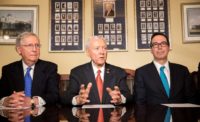As reports fly in Washington about White House plans for a $3-trillion economic recovery package, including a big infrastructure component, congressional committees are taking a more targeted approach. They are drafting legislation to authorize substantial sums for specific infrastructure sectors that fall under their jurisdictions.
Brian Turmail, a spokesman for the Associated General Contractors of America, says, “The committees are likely ensuring to the greatest extent possible that they are meeting the goals of President Biden’s Build Back Better plan.”
Senate Majority Leader Chuck Schumer (D-N.Y.) said March 23, “We want a big, bold, strong package.” He added, “There are various different options that we’re exploring.”
White House plan may resemble 2020 house-passed “moving forward act,” which proposed $1.5t for infrastructure
Turmail says AGC’s “best guess” is that the White House plan’s infrastructure section will resemble the $1.5-trillion Moving Forward Act, which the House passed last July. It included $494 billion for highways, transit and rail. It also had $40 billion for Clean Water State Revolving Funds (SRFs), $25 billion for drinking water SRFs and $70 billion for clean energy. The Senate did not take up the bill last year.
Two House committees have laid down markers proposing aggressive amounts for the Environmental Protection Agency’s wastewater treatment and drinking water programs. House Transportation and Infrastructure Committee Chairman Peter DeFazio (D-Ore.) on March 16 introduced a five-year measure authorizing $50 billion for wastewater treatment infrastructure. The bill’s core is $40 billion for Clean Water SRFs. That program has long been the main federal funding source for wastewater projects.
The bill is silent on where the $50 billion would come from. Revenue bills are under Ways and Means Committee’s purview.
Another caveat is that, like all authorization bills, funding for DeFazio’s proposal would be subject to annual appropriations. The bill authorizes $8 billion a year for Clean Water SRFs. The SRF’s 2021 appropriation is $1.6 billion.
Kristina Surfus, National Association of Clean Water Agencies managing director for government affairs, says, “Congress will be challenged to find pay-fors for infrastructure investment of all types, including water.” She adds, “This clean water authorization package is a great first step, setting the stage for significantly higher appropriations.”
Democrats on the House Energy and Commerce Committee on March 11 unveiled a $312-billion, five-year multisector infrastructure bill. It would include $51 billion for drinking water, including $26.3 billion for the SRFs and $22.5 billion to replace old lead service lines.
The bill also authorizes $69.9 billion for clean energy and energy-efficiency programs, including $19.4 billion for electric grid infrastructure improvements. Health care facilities are another focus. The bill would provide $10 billion for hospital construction and modernization and another $10 billion for community health centers.
In the Senate, the Environment and Public Works Committee was scheduled to vote March 24 on legislation funding the EPA Clean Water and drinking water revolving funds. It would authorize $14.65 billion over five years for each of the two SRF programs.



Post a comment to this article
Report Abusive Comment